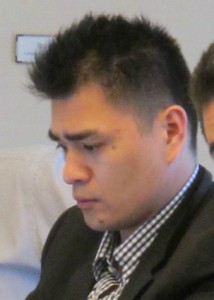Outed Undocumented Journalist Challenges Our Sense Of America
 Pulitzer Prize winning journalist Jose Antonio Vargas outed himself as an undocumented worker. The story ricocheted across the inter-webs.
Pulitzer Prize winning journalist Jose Antonio Vargas outed himself as an undocumented worker. The story ricocheted across the inter-webs.
By now the particulars of his life story are well known.
He was brought to the U.S. when he was 12 by a coyote who used forged documents to get him past the authorities. He found out he was undocumented when he was a teen and tried to get a California drivers license. With the help of more forged documents and the aid of a network of supporters he finished college, got a series of jobs in newspapers, rose to the prominence of American journalists who have won the Pulitzer and then decided
I’m done running. I’m exhausted. I don’t want that life anymore.
The story in his own words is filled with exquisite eloquence and raw sincerity. It’s also founded on tremendous courage.
He’s not the first to out himself in this manner.
The trend was started by undocumented college students who did it as an act of defiance against anti-immigrant laws and in support of the DREAM Act. Then there was the case of the Alaska police officer who didn’t really out himself; he was discovered, caught really, when he tried to renew his passport.
What all of these people have in common is that they lived typical American lives, but they lived them in fear of being found out. Each has forced us to look at our definition of America, and what it means to be American. But Vargas’ outing has been the biggest challenge of all. Maybe because of his high profile, or because of his overt success as a journalist, Vargas has held up a huge mirror and has asked that we collectively see ourselves through his eyes.
It’s a matter of perspective.
His is the quintessential American success story, the kind of story that politicians like to point to when they make speeches and they know that many people are listening. He went to school, worked hard, got good grades, distinguished himself among his peers, stayed out of trouble, contributed to his community, made a name and built a life for himself. What could be more American?
Apparently the ownership of a piece of paper that says he’s American would make him more so.
Vargas has shown us where the defined boundaries of being American are.
So now we’re on notice. We can never think of the undocumented in the same way. He’s successful, he’s gay, he’s Filipino and he’s forced us to look at him as he is – among us. These were, for me, the most poignant lines in his printed confession:
We’re not always who you think we are. Some pick your strawberries or care for your children. Some are in high school or college. And some, it turns out, write news articles you might read.
I’m sure he thought long and hard about this step. He runs the risk of being deported; he runs the risk of being turned into a poster-immigrant; he runs the risk of no longer being trusted, which is the death knell of any journalist. But there is, in the end, a human need to stand under the weight of all that is not authentic. I think that’s what Vargas responded to. And for that we should all be grateful.
There is, he showed us, an America that is not authentic because it rejects those intangibles that define us. He stood and showed us exactly where that defining line is. The burden is his, but the onus is now on us.
What will we do, now that we know?
Follow Victor Landa on Twitter: @vlanda
[Photo courtesy Knight Foundation]

